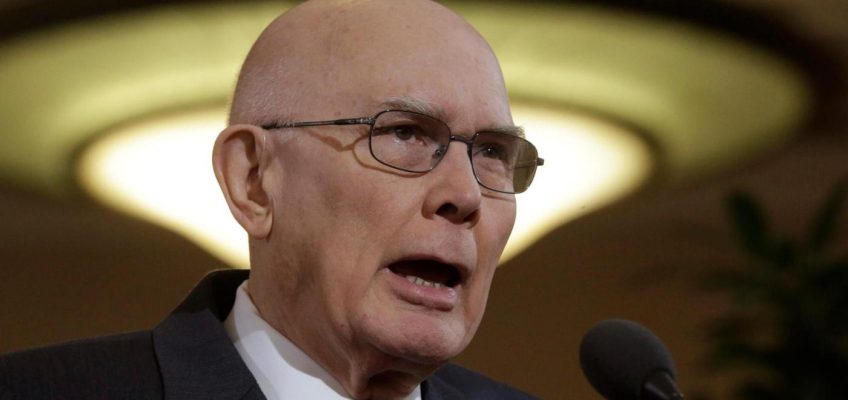By GARY FIELDS, Associated Press
WASHINGTON (AP) — Historically, the U.S. military has been an engine for cultural and social change in America. Defense Secretary Pete Hegseth’s vision for the armed forces he leads runs counter to that.
Related Articles
EPA’s job is to protect America’s air, water and land. Here’s how a shutdown affects that effort
Pope intervenes in US abortion debate by raising what it really means to be pro-life
Trump administration puts on hold $18 billion in funding for New York City infrastructure projects
Supreme Court lets Lisa Cook remain as a Federal Reserve governor for now
Trump signs an executive order vowing to defend Qatar in the wake of Israel’s strike
In comments Tuesday to hundreds military leaders and their chief enlisted advisers, Hegseth made clear he was not interested in a diverse or inclusive force. His address at the Marine Corps base in Quantico, Virginia, verbalized what Hegseth has been doing as he takes on any program that can be labeled diversity, equity or inclusion, as well as targeting transgender personnel. Separately, the focus on immigration also is sweeping up veterans.
For too long, “the military has been forced by foolish and reckless politicians to focus on the wrong things. In many ways, this speech is about fixing decades of decay, some of it obvious, some of it hidden,” Hegseth said. “Foolish and reckless political leaders set the wrong compass heading, and we lost our way. We became the woke department, but not anymore.”
Hegseth’s actions — and plans for more — are a reversal of the role the military has often played.
“The military has often been ahead of at least some broader social, cultural, political movements,” said Ronit Stahl, associate professor of history at the University of California, Berkeley. ”The desegregation of the armed forces is perhaps the most classic example.”
President Harry S. Truman’s desegregation order in 1948 came six years before the Supreme Court ordered school desegregation in the Brown vs. Board of Education case — and, Stahl said, “that obviously takes a long time to implement, if it ever fully is implemented.”
U.S. military senior leadership listen as Secretary of Defense Pete Hegseth speaks at Marine Corps Base Quantico, Tuesday, Sept. 30, 2025 in Quantico, Va. (Andrew Harnik/Pool via AP)
It has been a circuitous path
Truman’s order was not a short progression through American society. Although the military was one of the few places where there was organizational diversity, the races did not mix in their actual service. Units like the Tuskegee Airmen, the Navajo Code Talkers and the Buffalo Soldiers, formed in 1866, were segregated until the order opened the door to integrated units.
Women were given full status to serve in 1948 with the Women’s Armed Services Integration Act. There were restrictions on how many could serve and they were generally not allowed to command men or serve in combat. Before then, they had wartime roles and they did not serve in combat, although hundreds of nurses died and women were pilots, including Women Airforce Service Pilots, or WASPs.
The WASPs and Tuskegee Airmen were among the first groups this year to be affected when Hegseth issued his DEI order. The Air Force removed training videos of the airmen along with ones showing the World War II contributions of the WASPs at the basic training base in San Antonio. The videos were restored after widespread bipartisan outcry over their removal.
Other issues over time have included “don’t ask, don’t tell,” the policy that allowed gay and lesbian service members to serve as long as their sexual orientation was not public. That was repealed during the Obama administration. Women were allowed to serve on combat aircraft and combat ships in the early 1990s — then all combat positions after a ban was lifted in 2015.
“The military has always had to confront the question of social change and the question of who would serve, how they would serve and in what capacity they would serve. These are questions that have been long-standing back to the founding in some ways, but certainly in the 20th century,” said David Kieran, distinguished chair in Military History at Columbus State University in Columbus, Georgia. “These are not new questions.”
Generally the answer has come down to what “the military writ large” has concluded. “’How do we achieve our mission best?’” Kieran said. “And a lot of these things have been really hotly debated.”
Secretary of Defense Pete Hegseth speaks to senior military leaders at Marine Corps Base Quantico, Tuesday, Sept. 30, 2025 in Quantico, Va. (Andrew Harnik/Pool via AP)
Part of a larger, longer debate
Kieran offered one example: changes the Army made in the 1960s when it was dealing with a climate of racism and racial tensions. Without that, he said, “the military can’t fight the war in Vietnam effectively.”
The same considerations were given to how to address the problem of sexual harassment. Part of the answer involved what was morally right, but “the larger issue is: If soldiers are being harassed, can the Army carry out its mission effectively?”
While “it is important to see these actions as part of a longer history and a larger debate,” Kieran said, “it’s certainly also true that the current administration is moving at a far more aggressive and faster pace than we’ve seen in earlier administrations.”
Michael O’Hanlon, director of research in the foreign policy program at the Brookings Institution, questioned some of the actions that Trump’s Defense Department has taken, including replacing the chairman of the joint chiefs, Air Force Gen. CQ Brown Jr.
“He was a fine Air Force officer,” O’Hanlon said. Even if he got the job in part because of his race, “it wouldn’t be disqualifying in my book, unless he was unqualified — and he wasn’t.”
Matthew Delmont, a professor of history at Dartmouth College, said the current attitudes he is seeing toward the military suggest a misunderstanding of the armed forces and why the changes have been made.
“The military, for more than seven decades now, has been more on the leading edge in terms of figuring out how to put together an organization that tries to take advantage of the talents and capacities of all Americans,” Delmont said. Since Truman signed his executive order, “the military has moved faster and farther than almost any other organization in thinking about issues of racial equality, and then later thinking about the issues related to gender and sexuality.”
Delmont said bias, prejudice and racism remain in the military, but the armed services have done more “than a lot of corporations, universities, other organizations to try to address those head-on.”
“I wouldn’t say it was because they were particularly interested in trying to advance the social agenda,” he said. “I think they did it because they recognized you can’t have a unified fighting force if the troops are fighting each other, or if you’re actively turning away people who desire to serve their country.”




